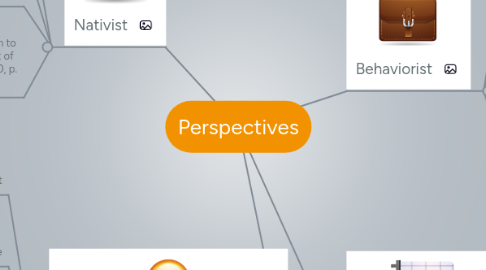
1. Nativist
1.1. Linguist: Noam Chomsky
1.2. Focus on syntactic aspect of language knowledge (Otto, 2010, p. 28)
1.2.1. emphasizes inborn or innate human capabilities (Otto, 2010)
1.2.2. Focus on Nature (Otto, 2010, p. 28)
1.3. Universal grammer
1.3.1. Syntactic aspect of language knowledge
1.3.2. Call 2
1.4. use curriculum that encourages children to language and explore in hypothesis test of their language development (Otto, 2010, p. 29)
1.4.1. Children learn language by discovering the structure of their language (Otto, 2010, p. 29)
1.4.2. Semantic knowledge is also considered in the nativist perpective
2. Cognitive Developmentalist
2.1. Theorist: Jean Piaget
2.2. Nature
2.2.1. Language is acquired as maturation occurs and cognitive competencies develop (Otto, 2010, p.30)
2.2.2. Focus on semantic aspects of language knowledge(Otto, 2010, p. 28).
2.3. Encourages teachers to pay close attention to a child's stage of cognitive development to plan activities (Otto, 2010, p. 31)
2.3.1. Capacity for mental representation must be present in order to develop language (Otto, 2010, p. 30)
2.3.2. Sensorimotor Stage is sensory experience
2.4. Begin to represent the world with images, words and pictures (Otto, 2010)
2.4.1. Preoperational stage ages 2-7
3. Behaviorist
3.1. Theorist: B.F. Skinner
3.2. Nurture
3.2.1. learning occurs based on stimuli, responses and reinforcements (Otto, 2010)
3.2.2. Semantic, syntactic, and , morphemic aspect of language knowledge (Otto, 2010, p. 28)
3.3. Operant conditioning where children are taught through situation (Otto, 2010).
3.3.1. Imitative speech
3.3.2. does not give complete explanation of for the development of other languages (Otto,2010, p. 32)
3.4. Teachers would focus on stimuli and reinforcements that children experience in regard to language (Otto, 2010, p. 33
3.4.1. Meeting 1
3.4.2. Meeting 2
4. Interactionalist
4.1. Theorists: Lev Vygotsky, Bruner, and Halliday
4.2. Pragmatic aspect of language knowledge (Otto, 2010)
4.2.1. Task 1
4.2.2. Task 2
4.3. Nurture
4.3.1. Call 1
4.3.2. Call 2
4.4. Focus on primary role of sociocultural interaction of language (Otto, 2010)
4.4.1. focus on the process rather than product (Otto, 2010, p. 33)
4.4.2. The primary role of social interaction in language development is based on the observation that children acquire the awareness of specific communications functions (Otto, 2010, p. 33)
